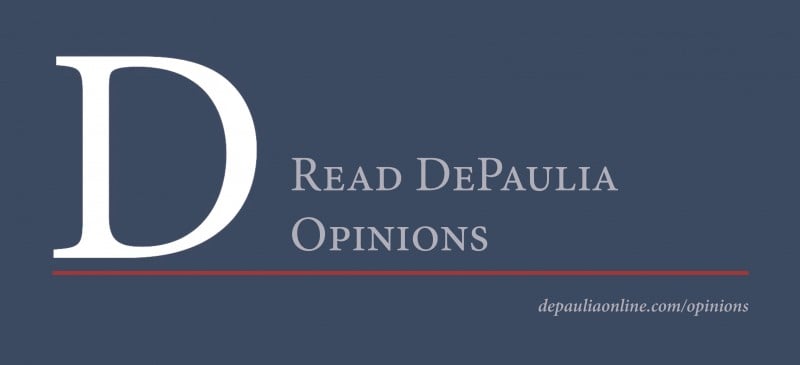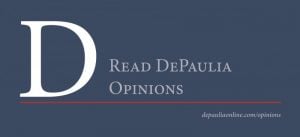Open letter to the DePaul Board of Trustees: Make your investment profile public
Correction: A previous version of this article incorrectly stated that DePaul University pulled its investments with Israel in 2014. The university never pulled investments within Israel. The editors acknowledge and regret the error.
Every day, when walking past the Student Center on DePaul’s Lincoln Park campus, students are questioned by the statue of Monsignor John J. Egan: “What are you doing for justice?” In 2014, the DePaul University administration was petitioned by pro-Palestine students to divest from pro-Israel investments, amidst opposition from pro-Israel lobbyists on campus. The Board of Trustees maintains the confidentiality of their investment portfolio. Though this is within the university’s legal rights, a university that claims to be morally driven should – on principle – make their morally consequential behavior public to be held accountable for said behavior.
Supposed divestment from past morally questionable investments is not enough to expose the true character of the board of trustees. We the students call for full disclosure of DePaul’s investment portfolio in order to ensure that DePaul’s mission statement and public service responsibility are carried out through its actions. DePaul’s mission statement states that “the university encouraged faculty, staff, and students to apply specialized expertise in ways that contribute to the societal, economic, cultural, and ethical quality of life in the metropolitan area and beyond.”
The intrinsic value of this mission statement could be contradicted if the university maintains investments in corporate giants which place more value in profit than people. As students, we trust that with the exposition of DePaul’s investment portfolio, the potential for public scrutiny will incentivize the board of trustees to display good moral character by adhering to the university’s mission statement. As tuition-paying students, who agreed to this mission statement upon enrollment, we deserve a framework to hold our administration accountable for its decisions.
It is impossible to say with certainty where DePaul’s funds are allocated currently, but by looking at the corporate sponsors of DePaul events and the past and current job titles of the Board of Trustees, connections to certain corporations can be made. Namely, in 2014, DePaul elected William “Bill” Kusack, the former managing director at JP Morgan Capital Corp., to its board of trustees. Since 2015, the “Blue Demon Team” of DePaul faculty have joined the JPMorgan Chase corporate challenge, an annual “3.5-mile (5.6-km) running events open to groups of full-time employees from organizations within the business and public sectors” alongside teams from JPMorgan Chase corporate partners such as Groupon, T-Mobile, Wells Fargo and many more. It cannot be determined with certainty whether or not the DePaul Board of Trustees actually invests in JPMorgan Chase, but close public ties with the corporation like these make financial association probable.
Most recently, in January of this year, the DePaul Board of Trustees announced that Judith P. Greffin, the retired executive vice president and chief executive officer of the Allstate Corporation would be joining as its 45th member. While working at Allstate, Ms. Greffin worked with State Street Corporation (of which Allstate CEO Tom Wilson also serves on the board) to finance Allstate’s investments. The State Street Corporation is the largest shareholder in Lockheed Martin, the world’s largest arms manufacturer, with over $800 million invested in the company. Lockheed Martin missiles, planes, and chemical weapons are routinely used by the U.S. military and the state of Israel on Syrian and Palestinian civilians, acts which I need not describe and can not defend.
There are a multitude of ethical, sustainable corporations on Wall Street that do not support environmentally detrimental behavior, such as JPMorgan Chase, which currently has upwards of $400 million invested in Energy Transfer Partners, L.P., the company that financed the Dakota Access Pipeline. We understand that it is both in the best interests of the students and university to maintain a profitable portfolio, but profit and ethics do not have to be mutually exclusive.
It is possible for the board of trustees to uphold their portfolio of sound investments without using the endowment and student tuition dollars to support morally reprehensible causes by association with their corporate investors. For these reasons, it is imperative that DePaul’s investments are made public.





